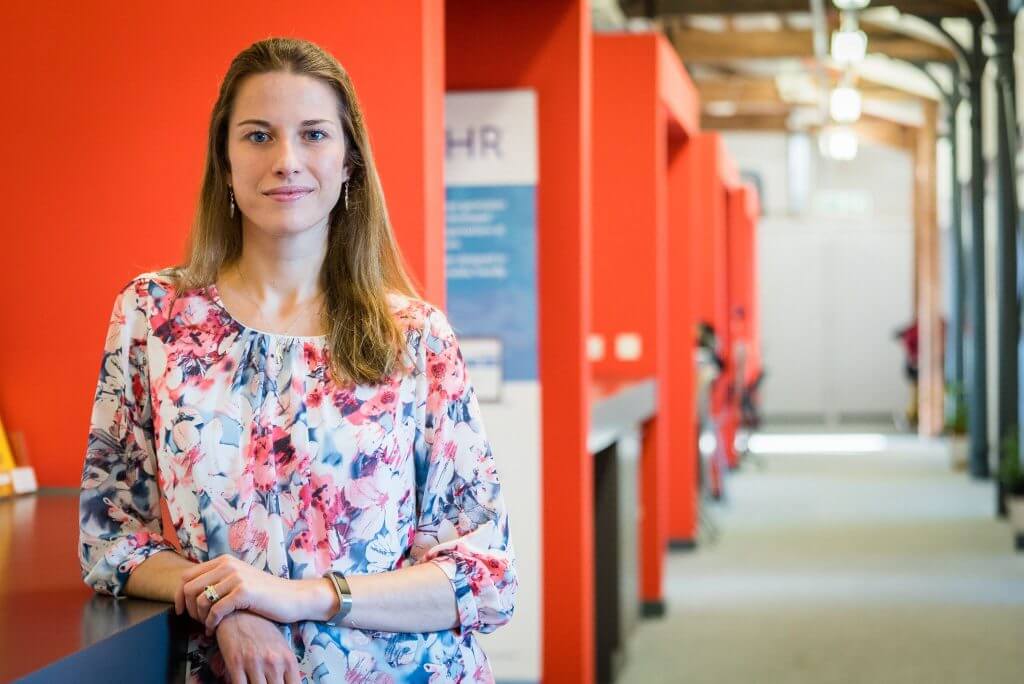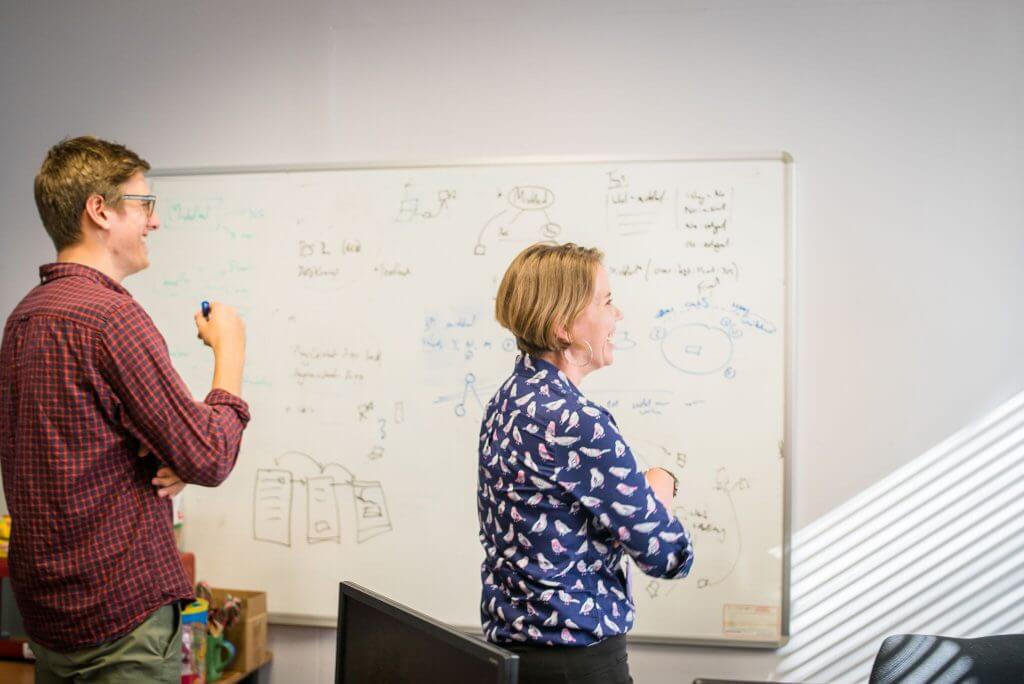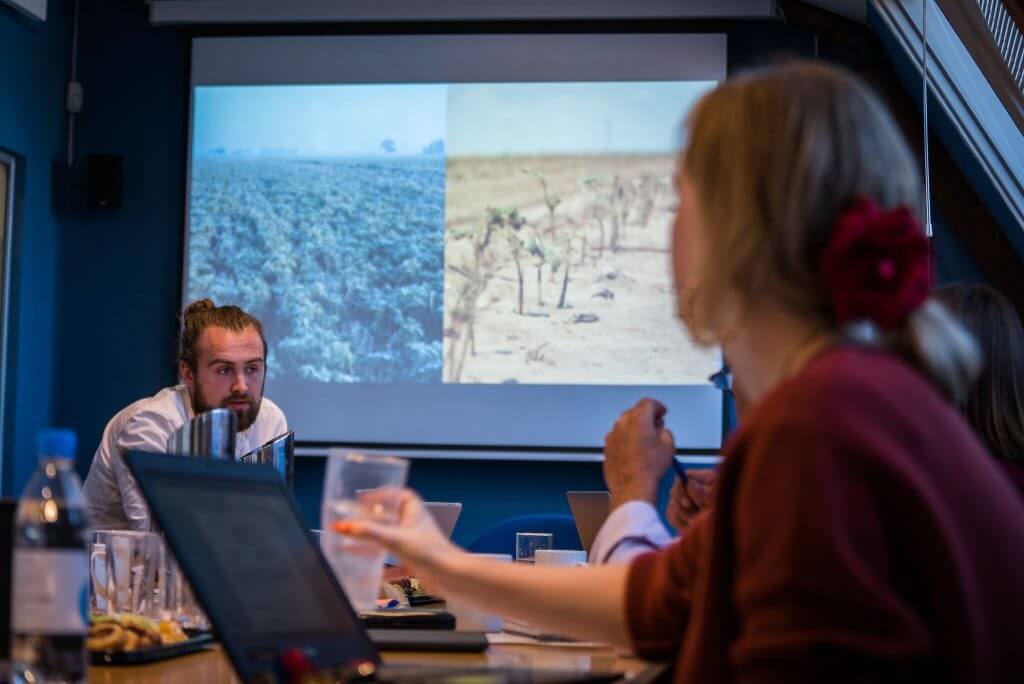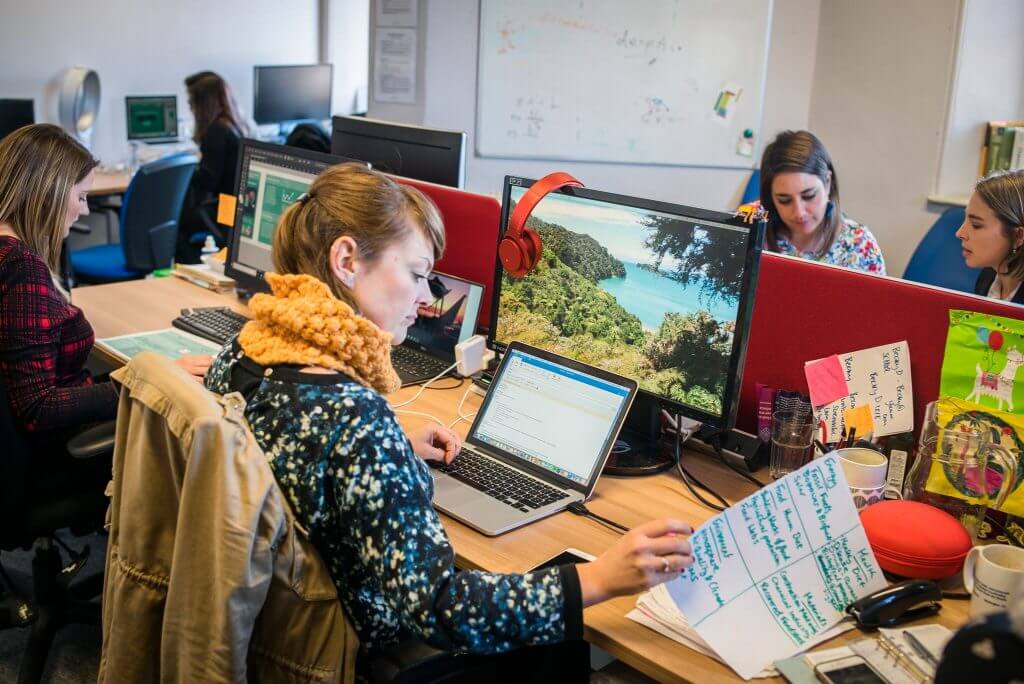Monika Radclyffe is the Centre Director at SETsquared Bristol, the world’s no.1 university business incubator. To date, they’ve helped over 200 startups achieve success, including big names like XMOS, Ultrahaptics and YellowDog. We caught up with Monika to find out how SETsquared supports founders and grows winning businesses.
Award-winning incubator network SETsquared is at the centre of all things tech in the south-west. And we’re certainly no stranger to their work at CookiesHQ. We’re proud to be the technical partners for two up-and-coming SETsquared alumni – artisanal grocery delivery service GoodSixty and independent living support app AutonoMe.
We set out to discover what qualities Monika’s team look for in their applicants, how they’re tackling the problem of diversity in tech and what the future holds for the ambitious network.
How did you come to be in the incubator industry?
I lived and worked in London when the tech bubble was emerging but I wanted to try something different, so I started thinking ‘where are the other cool tech centres in the UK?’ Bristol looked really interesting and so I started digging deeper, subscribing to all the newsletters and getting to know the people and I realised there’s so much talent here.
Bristolians tend to be modest – they keep their heads down and work hard and they’re not recognised enough. I realised there was so much potential here compared to London, where there’s a lot more ‘talking up’ than actual doing. Then the Centre Director role at SETsquared Bristol became available so it was the right timing – my predecessor, Nick Sturge, worked in the role for ten years so it doesn’t come up that often! I applied, got the role and I’ve been delighted to be here since.
‘We follow the concept of “you don’t know what you don’t know” – and help founders work it out as fast as possible.’
What role does SETsquared play in a startup’s journey?
We are an incubator for high-growth businesses. We’ve spent the last 16 years being very active in the tech scene and we’ve incubated over 200 companies in that time. Many tech companies that you’ll come across in Bristol have come through SETsquared – including big ones like XMOS, Ultrahaptics and YellowDog. It creates a nice loop because those entrepreneurs then recommend us to other entrepreneurs as a place to go and get help.
What we really do is work with founders to accelerate their pace of growth, help them avoid mistakes and fill in the gaps of their knowledge. We follow the concept of ‘you don’t know what you don’t know’ – and help them work it out and expand as fast as possible.

How do you decide who you’d like to accept?
We ask everyone to fill out an online application form and then invite applicants to interview. After the interview, we accept about a quarter of initial applicants. So 75% are rejected and this is mostly due to the fact that they’re too early-stage for us.
What we’re looking for is technology businesses that have unique software or hardware that they’re working on. If they don’t have that, they usually get rejected before the interview. At the interview, we spend an hour getting to know the founders as individuals, learning about the current market research of their business and where they’ve got to. We want to know – are they fully committed to the business? What is the market potential for that technology? Have they started speaking to customers? Have they got initial funding? We have limited resources in terms of what we can contribute and how many companies we can take on, so often we have to judge which business will have the biggest success and where we can add the most value.
We also try to pick companies that don’t compete with our existing cohort of memberships because we don’t want an internal conflict of interest. If we had five recruitment agency applicants that were using AI to optimise their model, we’d have to decide which one was going to be most successful based on the profiles of the founders, the quality of the research, the technology and so on.
‘If you have an idea, you have to go out and speak to people about it. The more people you speak to, the more you learn.’
Do people re-apply when they don’t get in?
Yes, it happens quite often. A lot of people we reject have an idea but they haven’t really thought through the business side, or who they’re going to sell to. We always give feedback based on our discussion, and homework, and if we feel they do have potential we’ll say ‘we can’t offer you membership just yet but please re-apply in six months’ time’. We also recommend that applicants read our resource blogs to help with the application and re-application process. We’ve had quite a few companies that have got through the second time – for example, YellowDog is a successful business now but was initially rejected.
If you have an idea, you do have to go out and speak to people about it. The more people you speak to, the more feedback you get and the more you learn. We love finding out about new ideas but interviews are also a way for us to give something back to those applicants as well.
What are the most common reasons for a startup not graduating from SETsquared?
Failing – shutting down a business – is the most common reason. I’d say about 20-25% of companies shut down their operations while they’re with us. We actually count this as a positive outcome, because if we can help them fail fast it helps them save money, resources and their own time. The founder of successful café chain Friska, Ed Brown, applied to SETsquared with his tech idea and it didn’t work out. But he went on to set up Friska, so it was a very positive outcome because he was able to refocus his energy into something worthwhile.
Of those that graduate SETsquared, only about 3% don’t succeed. It just shows that we build resilience and sustainability in those that are meant to survive. Once they go out into the world they go on growing and thriving.
‘We very often judge the potential success of the business on the attributes of the individuals running them.’
Can you tell when a startup is going to have an impact?
We have this business theory called ‘first, second and third mile’. A business isn’t going to stay the same all the way through, so the first mile is when you’re doing everything as a founder, playing every role. Many people just love starting up and creating something from nothing.
The second mile is when you get a little bit of funding and start building a team – so maybe you grow to five or ten people and your focus as an entrepreneur changes. You have to start thinking about how to manage your people, how to enable them to achieve your vision, how to create a company culture and raise more funding.
And the third mile is – once you’ve got more funding – how do you get from 10 to 100 employees? It becomes a corporate environment, you’re not that founder-entrepreneur who’s doing everything in the business any more. You may focus much more on your sales strategy, or your exit plan.
If you think about it, you almost need three different people – one for each stage of the business. So we explain this theory to applicants and ask them ‘do you see yourself on those three parts of the journey? Or do you see yourself as the first one, but the other two don’t sound as interesting?’ It just helps them to realise that, in starting this business, they may not be able to go along with it for the whole journey. And if they really care about the success of the business rather than their own interests or ego, will they be able to step away and bring in another CEO to run the business?
We test this idea with them and see how open they are to change and receiving feedback, because that’s hugely important. If someone gets very defensive and isn’t open to our challenge and our questioning then it will be very difficult for us to help them. We very often judge the success of the business on the attributes of the individuals running them.
How do you ensure that SETsquared is inclusive?
It’s a big issue in the tech sector, which is a very white, male environment. When I joined SETsquared, we focused a lot on gender diversity. We commissioned research into how we could make SETsquared more inviting to female founders and we’ve made huge progress since then. At that point, two and a half years ago, we had 4 female entrepreneurs, now we have 14, which is 15% of our overall membership and in line with the national average. So it’s still poor – there’s still a lot of work to be done – but I’m glad it’s increased.
There’s been a lot of work in the meantime too. We engage with women in tech groups, encourage female entrepreneurs into public speaking and create media around it. We changed up our comms, content and marketing in simple ways – making sure our language and images represented all genders.
Our research shows that women are less self-confident and need more pro-active encouragement to bring them onboard. We often meet amazing woman entrepreneurs and they just say ‘oh, I’m not sure my idea is good enough for SETsquared’. So we host events like #Idea2Pitch that allow them to bring their idea with no obligation, no judgement. They spend half a day working on their idea, shaping it up and practising their elevator pitch. And if they feel that they’re ready by the end of it, then they can apply.
Of course, gender isn’t everything. Again, we looked at our stats and saw that we’re not very diverse when it comes to ethnicity. Over the summer we commissioned a report to see what obstacles are preventing Black, Asian and Minority Ethnic (BAME) applicants from applying to incubators like ours. So now we’ve got a brilliant piece of research which makes a lot of recommendations for us and we’re just starting to implement these.
It’ll involve us taking events on the road – we’re actually hosting our next one in St Pauls’ Community Learning Centre – to engage audiences that normally wouldn’t hear about us. We’re also trying to find more diverse advisors, mentors and role models.
Another piece of work actually involves our companies because – when you think about it – we have 83 businesses in the incubator and I feel it’s our role to help them be more inclusive and diverse as well. Because the majority of founders are male and white, they just bring their mates onto the team and there’s a point in time where they realise ‘oh gosh! We’ve got 15 guys that look like me!’ It’s only then that they realise it’s a problem.
So we help founders think about inclusivity much earlier in the journey. It’s part of the conversation we have when they join SETsquared – we ask them ‘what can we do to help you be a more diverse business? Can we look at your job specs to see if they’re inclusive?’ and we work with various agencies to promote those vacancies to a diverse audience.
‘It’s great to be see that we’re adding value through our work – there are lots of opportunities to make a real difference.’
How do you help startups raise funding or find finance?
The most important thing we can do is help our companies be ready for those conversations with investors.
We provide essential business training to our companies – a full day of training on investor readiness and workshops on understanding your finances and pitching your idea. Before you start speaking to investors you have to have a good grasp of your own finances and your business plan. You need to know ‘how much money do I need? How am I going to spend it? What do I want to achieve?’ So there’s a lot of work to be done before they even put their investment pitch together.
We have an in-house team of entrepreneurs-in-residence who work with them to put together an investment presentation and an executive summary, and that’s a lot of work in itself. Once they’ve put those materials together and we know the business is ready from a financial and legal perspective, then we can start making introductions to our contacts in various angel and VC firms.
But it doesn’t finish there – once they’ve started having those conversations they very often they come back saying ‘they want to know our evaluation – how do I do that?’ So there’s a lot of coaching and help that goes on around those negotiations too.

How does SETsquared impact the wider tech community in Bristol?
We are part of a partnership with five investees and incubators in the south west and they’ve just published an economic report that quantifies what we are adding to the ecosystem. The stats are huge – we’ll be adding something like £27 billion of value added to the economy by 2030.
We have big plans for scale, in terms of helping more companies to grow. Eventually, it all boils down to how many companies we can help to grow successfully, then those companies bring the money into the region and create jobs for the local economy. But not only that – they create wealth and they create capital. When founders scale businesses and exit, we’re also creating the next generation of serial entrepreneurs or angel investors, who will re-invest into the next generation of startups. So it creates a circular economy in the tech startup scene.
It’s great to be part of that and see that we’re adding value through our work. That’s what drives me and makes me love my job – every day is different and there are lots of opportunities to make a real difference.
‘We’re starting to think about what we could do if we had even more space.’
How do you see the Bristol startup ecosystem evolving over time?
It’s a more busy and vibrant space than it was when I joined SETsquared in 2016, and we have a lot more working spaces and incubators in the city to accommodate that growth. But in terms of the sectors that are emerging, we recently saw the acquisition of Ziylo, which really helped put Bristol on the biotech map. Now we’re hoping it will really kick-start more biotech spinouts and attract others from across the country to move here. Another that I bet is going to be very strong will be quantum computing, became the University of Bristol is investing a lot in quantum and there’s a Qtech centre already investing in and training research fellows in more commercial areas.
We want to increase the number of people we can help here but we have the opportunity to expand physically as well. We have plans for Engine Shed 2 – a bigger building that could accommodate more companies – but we’re also talking with the University of Bristol about having a presence at the new Temple Quarter Campus development in a couple of years. We’re starting to think about what we could do if we had even more space and ways of engaging more with academia and industry.
More stories from the Bristol tech scene:

